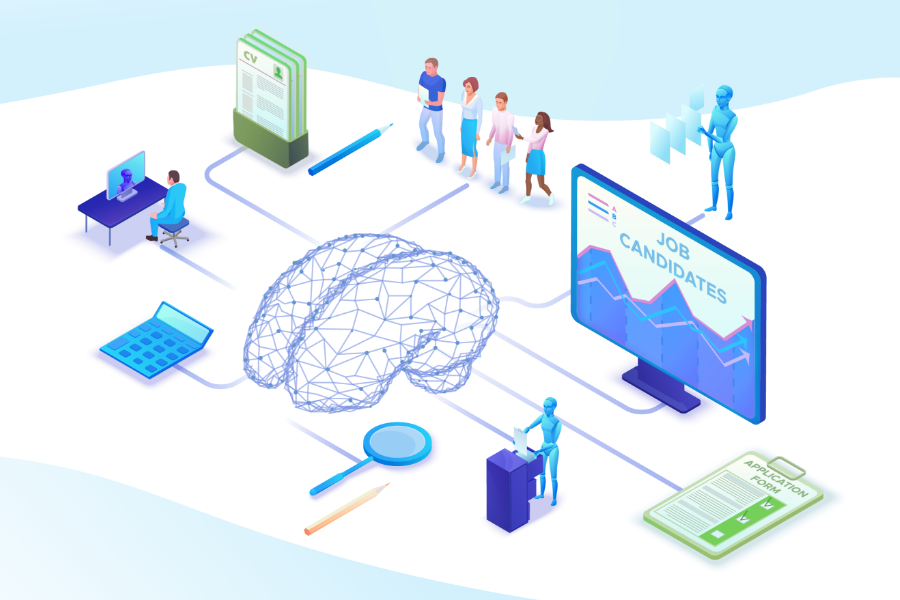
The fear of AI replacing HR jobs is based on not knowing what AI can - and what it cannot - do. AI relies on data processing and pattern recognition, and it cannot replace the unique elements of a job that require human intervention such as assessing personality or giving personal advice based on experience. AI can learn from millions of data within seconds, but it cannot provide the reasoning behind it. Even though AI software development speed is accelerating and AI complexities and learning capabilities are growing exponentially, human intervention cannot be fully mimicked.
Will AI replace HR jobs?
Advanced AI can address only high frequency issues with readily available solutions. In fact, that means that HR departments can enjoy their role much more as AI takes over the dull tasks and allows them to focus on the human aspects of their jobs such as final hiring decisions, strategic planning, and finding creative ways of retaining employees and keeping them engaged in the company culture.
Paradoxically, adopting AI in HR processes can make us more ‘human’ as we can focus more on improving soft skills such as empathy, social awareness and communication.
The AI@Work 2021 Global Study conducted across 13 countries with nearly 15000 participants revealed that when asked if a robot can support an employee’s career better than a human, 82% said yes, 85% wanted technology to help them define their future, and 55% want to stay with company that uses AI to support their career growth.
How is AI currently used in HR?
Below are some examples of how AI is used in HR departments.
- Recruitment - Many companies use HR automated software and enterprise resource planning systems (ERP tools) for repetitive and time-consuming HR processes such as applicant tracking, onboarding tasks, scheduling, evaluations, training and pre-screening of applicants, and many more. Learn more about using HR automation for recruitment on our blog. And if you are preparing for automating HR processes, you can find more information on the fundamentals of HR too.
- AI video analysis – AI has taken over pre-hiring interviews and assessments in some companies. Live video interviewing software with evaluation tools and interview guides enables candidates to record a video and take tests out of office hours, from anywhere. Quicker analysis and less paperwork shortens recruitment process time and eliminates bias and errors.
- HR analytics – AI is used to process historical data to predict future outcomes. Correct data provides the HR team with a better understanding of their workforce, alerts them about issues, and pinpoints any challenges the organization is facing. This means that proactive strategies can be put in place ahead of time.
- Conversational AI – Advanced software is being applied to process user case data for workplace chat bots or AI assistants to communicate with candidates 24/7 during recruitment and onboarding. Coaching, mentoring and training can also be performed by AI software. Many companies use an integrated chat box to answer FAQs or to route any requests to the correct place.
- Machine learning – Advanced software is learning to shortlist candidates and to streamline or automate repetitive, high volume recruitment tasks.
What will AI change in human resources?
AI will take over HR tasks wherever it can. HR departments will need to understand and work with the evolving technology and prepare for the change in demands of the future workforce as to what they want and what are they willing to take. When browsing job advert portals, the next generation will be looking for different job and organization criteria from what we have now. Work–life balance, sustainability, and employment culture will play a much bigger role. HR teams will have to upskill and adapt for the shift. Required skills for HR jobs will likely be creativity, flexibility, adaptability, and excellent soft skills.
AI will learn from past successful candidates who remained in the company and use the data for screening. It will learn to understand the relationship and connections between one skill and another, between a skill and a job title, and make associations and inferences of skills and jobs. It will be able to match jobs with the best suited applicants on job advertisement sites, so that the recruitment process will be shortened further.
What jobs will remain in HR with AI?
HR departments will stay as long humans are needed to do jobs. They will have the final say in hiring decisions based on their unique knowledge, experience, and risks they are willing to take. HR professionals will get to know employees in a way that no AI can, and will continue to use their soft skills to communicate with the team. However, the payroll segment of HR work will likely go, as it can be fully automated.
Read on: HR process automation can land you a better candidate.
Embrace AI in HR: how to use it to your advantage
Start with little steps: first, pick your HR software or ERP tool to streamline your HR processes. Consider your organization’s needs, future strategy, size and budget. A good HR software will offer scheduling tools, applicant tracking, time off management, candidate management, time tracking and evaluation tools - to name but a few. Modular ERP systems like Vault-ERP allow you to automate areas of HR processes that are specific to your business.
Read on: Top 7 HR automation tools of 2022.
HR and AI software integration in your business processes will empower HR departments and the whole organization by making HR processes effective, understanding the workforce better, saving a large amount of time, reducing human error, providing valuable data, and ultimately preparing you for the future of HR.